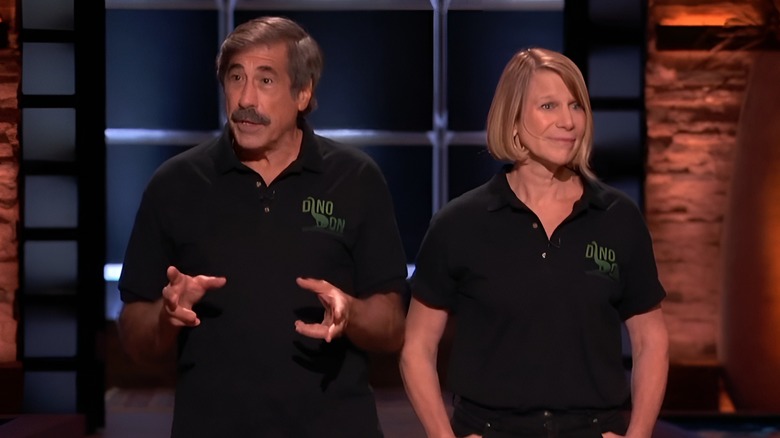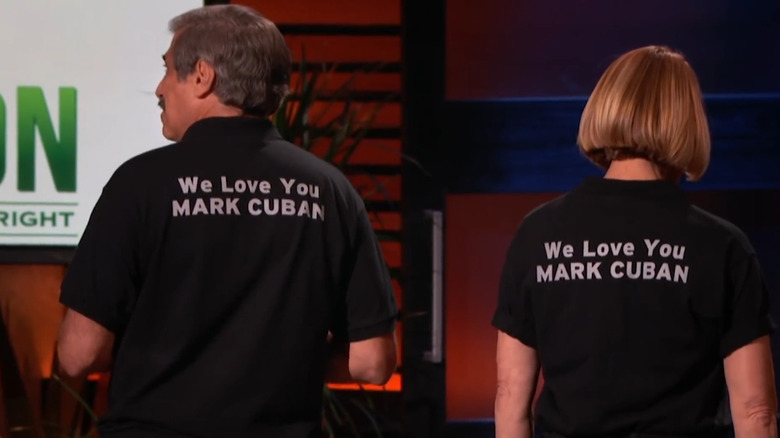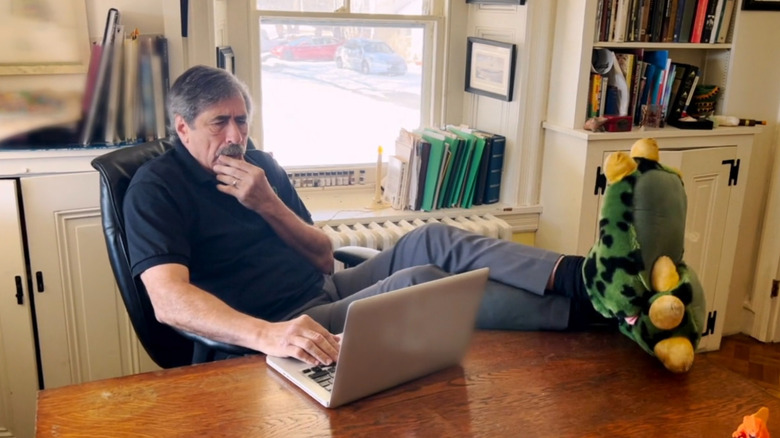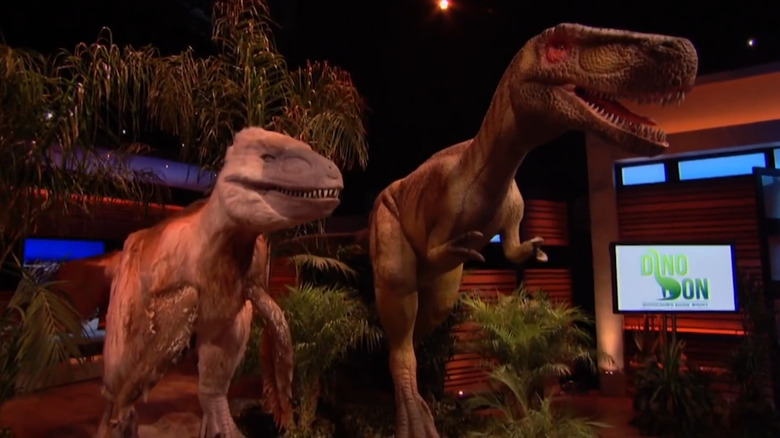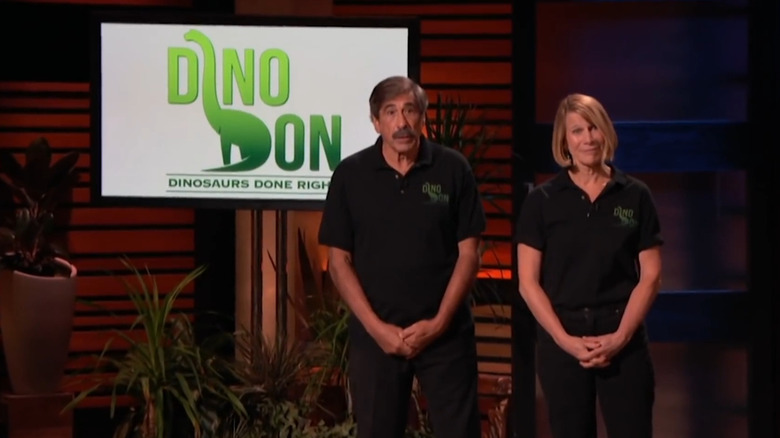What Happened To Dino Don (Animatronic Dinosaurs) From Shark Tank Season 12?
Whether you're 5 or 55, it's hard not to be awestruck by dinosaurs. The idea of enormous creatures once dominating our planet before mysteriously disappearing sparks fascination, especially with new information coming out all the time, such as whether dinosaurs were fatter and weirder than we suspect. And celebrity investors are among those intrigued, as dinosaur expert and entertainer Don Lessem demonstrated in 2021's "Shark Tank" Season 12 finale.
After writing about paleontologists for the Boston Globe in 1988, Lessem had dedicated his life to researching dinosaurs. His new path led him to write several books, act as an advisor to "Jurassic Park" and Disney's Animal Kingdom, and even have a species of dinosaur, the Lessemsaurus, named after him. Following his "Jurassic" experience, Lessem convinced director Steven Spielberg to donate all of the film's models and props for an exhibit debunking the movie's scientific inaccuracies. It went on to raise $3 million and got Lessem started in the exhibition business, which led to the 2017 launch of Dino Don, a company that creates realistic, life-sized dinosaur animatronics for public events and exhibitions.
Lessem and his wife and business partner, Val Jones, appeared on "Shark Tank" seeking a $500,000 investment for 10% of Dino Don. After showing what his animatronics could do, Lessem described the lifelike accuracy of these dinosaurs hundreds of feet long. Here's what happened next.
What happened to Dino Don on Shark Tank?
Lessem and Jones dove into the company's method of placing its models at zoos and museums to increase attendance, describing how one event brought in 440,000 visitors who came solely for the dinosaurs. The sharks were wowed by the robotic dinosaurs' high quality, and stunned when they learned that the average dinosaur animatronic cost only $5,000 to produce.
The pair explained that the zoos had been having trouble paying the company due to financial constraints brought on by the COVID-19 pandemic and wanted to share gate revenues instead of renting the dinosaurs. Nevertheless, the dinosaurs continued to bring in money: $1.6 million in 2019, and $1.8 million already in 2020 by the time the episode was filmed in September. They planned on hitting nine venues within the next seven months and needed funding for marketing, staff, and technicians. Within a year, they intended to hit $3 million, plus whatever they earned in gate shares.
However, their plan for making an annual profit of $2 million despite the company having only $250,000 a year of prior profit didn't add up for most of the sharks. Every investor declined except for Dallas Mavericks owner and entertainment expert Mark Cuban, who saw potential for the company in aiding the similarly struggling concert industry. He offered the $500,000 for 25% equity which, after a bit of hesitation and discussion, the duo accepted.
Dino Don after Shark Tank
Following the airing of the Dino Don "Shark Tank" segment on May 21, 2021, viewers had a T-rex-sized hunger for Lessem's company. Like many businesses that appear on the hit reality series, Dino Don experienced an explosion of traffic in its immediate aftermath, a phenomenon known as the "Shark Tank" effect. The company's website got 2,300 hits within a minute of the segment airing. He also received inquiries for events including setting up a "Jurassic Park" style exhibit on the island of Kauai, the Hawaiian island where portions of the original film were shot.
Lessem and Jones made a second appearance on "Shark Tank" during Season 13 for an update segment. Cuban's investment had gone toward improving their animatronics' technical finesse and creating a safari-like tour experience. Since the show, their 150 animatronics had grown to more than 400 stationed across countries including France, Belgium, England, and Germany. Their collection now included dragons, massive insects, and Ice Age mammals. Dino Don exceeded its $3 million revenue estimate, making $4.25 million in annual sales after "Shark Tank." Cuban said expanding the tours and raising prices were key contributors in helping reach these numbers and predicted the company would bring in $10 million within two years.
Later that year, Cuban appeared on an episode of "The Drew Barrymore Show" where he discussed his desire to have Dino Don build an extensive dinosaur exhibit in the small town of Mustang, Texas, which he had recently purchased.
Is Dino Don still in business?
Dinosaurs may be long gone from our planet, but Dino Don has shown no signs of slowing down. The company currently has exhibits across the United States at venues in New York, Florida, Oregon, Texas, and Utah, to name a few, as well as international locations such as Switzerland.
Dino Don offers many services, including custom robotics, venue planning, traveling exhibits, seasonal activities, and media services. Venues wanting to partner with Dino Don can choose exhibits that range from prehistoric-centric displays such as "Giant Dinosaurs: How They Got So Big" and "Giants of the Ice Age" to shows based on currently extant wildlife including "Insectopia" and "Ocean Odyssey," and even a showcase centered on Mongol conqueror Genghis Khan that presents artifacts from the 13th century. Venues can also set up custom dinosaur events and displays.
The company also has a presence on several social media platforms – Instagram, Facebook, X (formerly Twitter), and YouTube. And Lessem hosts a family-centric brand on the Dino Don website, Fun with Dinos, where kids can learn more about dinosaurs and engage in activities and contests.
What's next for Dino Don?
Dino Don may not be among the more traditional companies such as Larq Water Bottle and PolarPro that have gotten "Shark Tank" deals, but that's partially what makes its story so inspiring. Lessem's passion, combined with his team's economical execution and strategic planning, have kept the company afloat even during challenging times. Businesses such as this are a rarity to get a deal on "Shark Tank," let alone from Cuban.
While the company has proven its worth in zoos, botanic gardens, and museums, Lessem has ambitions to expand into new spaces. Speaking with Planet Attractions shortly before his "Shark Tank" debut, Lessem said, "The theme park market is one we really haven't penetrated yet and I think it's crazy that we haven't. The only time I've seen dinosaur robots, other than in specific attractions, was when Cedar Fair had a deal with a manufacturer where they would bring in 50-60 dinosaurs to Kings Dominion." Given Lessem's experience guiding dinosaur-themed exhibitions for amusement parks such as Walt Disney World, it would only make sense that he'd want to apply that expertise to his own business.
In 2023, the team took its first massive step in this arena with the Dino Off Road Adventure at Six Flags New England, which was replicated at Six Flags Over Texas in 2024. If Dino Don's past success is any indicator, you can expect its dinosaurs to stomp at your favorite theme park in the near future.
